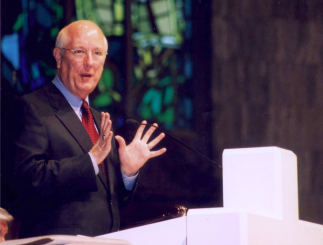Jim Daly is president of Focus on the Family, one of the most influential evangelical ministries in the United States during the last 50 years. When Daly speaks, evangelicals listen. If what he said at the recent “The Gospel and Politics” conference in Nashville is a sign of the future, there may be a new day coming in the way Southern Baptists and other evangelicals engage political issues.
The biblical image of the prophet is often at odds with the image of the Christian evangelist, Daly said at the conference sponsored by the Ethics & Religious Liberty Commission (ERLC) of the Southern Baptist Convention (SBC). For the past several years, evangelicals have lived out of the Old Testament model where we wanted to “straighten people out.” Referring to the “climate we are now in,” Daly said Christians must remember the tone in which they communicate because their first responsibility is that of the evangelist — to convey the gospel, not win a political argument.
Daly recalled that Focus on the Family and evangelicals generally were extremely critical of the Family Medical Leave Act adopted during the Clinton Administration. “When you now have time to reflect, giving a mom or dad time with a spouse in times of medical hardship or a new baby — it’s a good thing for families to pull together in those moments. I wish we had supported that.”
Changed perspective
Referring to this changed perspective, the Focus on the Family president went on to call for more civil exchanges in political debate saying Christians must always keep in mind how they treat people who disagree with them.
“We want the benefits of the kingdom of God,” Daly continued, “but we are not willing to do the work of the Kingdom that results in the fruit of the Spirit — love, joy, peace, patience, kindness, goodness, faithfulness, gentleness and self-control (Gal. 5:22–23).”
J.D. Greear, pastor of The Summit Church, Durham, North Carolina, was more blunt. “I may be wrong about my position on climate change,” he said. “But I am not wrong about my position on the gospel.” Greear added that if he conveys both convictions with the same intensity, he creates the impression that if you disagree with one position, you have to disagree with the other because they are tied together. Greear called that a hindrance to the gospel.
ERLC President Russell Moore told the more than 600 participants at the national conference that Christians cannot spend their lives figuring out what “tribe” they belong to and then making sure all they do conforms to that tribe’s beliefs and standards. “Our first loyalty is to Jesus,” he told the audience, adding that a Christian will be out of step with every tribe from time to time.
Moore pointed out that the tendency of some to tolerate “lunatics and heretics” inside the camp as long as they agreed with the political goals of an organization illustrates the real values are political and not gospel values.
Another speaker declared, “Evangelicals are not all Fox News Republicans.”
Several examples from the past were mentioned as “over-reaches” by evangelicals. Moral Majority, an evangelical political action group active in the 1980s, was referenced as an organization that sometimes spoke authoritatively without sufficient biblical support. For example in some of its voter guides Moral Majority called opposing nuclear disarmament and international nuclear treaties “the” Christian position.
One speaker even referenced Southern Baptist icon W.A. Criswell, who had to apologize for his stand against civil rights for African-Americans before being elected SBC president in the late 1960s.
Speaker after speaker advocated citizenship based on a gospel-informed conscience that included love of neighbor. For example Greear said about a third of The Summit Church congregation he serves is committed to issues around Christian justice. Another third prioritizes individual liberty issues. The challenge is to get the two groups to listen to each other and learn from each other because both reflect gospel values.
Unfortunately listening, learning and loving are not always the highest values in the political arena. Winning is the holy grail of politics and sometimes that means winning at any cost. Daly shared that professional marketers had advised him to “ramp up the fear factor” in all Focus on the Family messages in order to get a better response to direct mail, fund-raising efforts and member action.
When one’s motivation is fear, there is little room for love.
Some polls indicate that traditional Christian evangelical understandings may be minority positions in today’s society but being a minority does not make one a helpless victim. That ethic of the Church is not determined by the will of the majority or by Supreme Court decisions. Ethical positions are not determined by social and economic policies, cultural norms, political party identification or anything else. The ethic of the Church is determined by the gospel of Jesus Christ.
Perhaps the clearest example of that principle was illustrated in the civil rights movement led by Martin Luther King Jr. At a time when the will of the majority and the rulings of the Supreme Court were against him, King appealed to a higher law — the moral law of the gospel. Standing firm on that commitment he helped change a nation.
Christians do damage to their cause and to their Christ when they respond in anger and hostility to those who differ with their reasoning or their worldview.
Those who “love their neighbor as themselves” are propelled into the public square to deal with issues that impact others. As we do so, we must remember that we are first and foremost ambassadors for Christ (2 Cor. 5:20). Therefore we must communicate in ways that reflect our Savior.
If that approach begins to describe evangelical involvement in political issues, it could be a first step in turning around the incivility that characterizes so much public discourse.




Share with others: